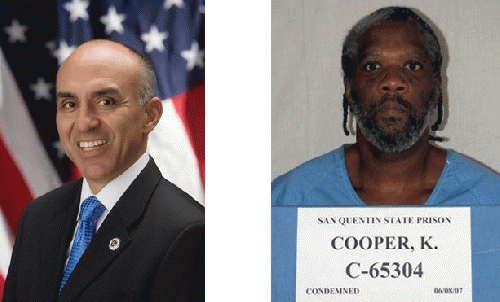San Bernardino County District Attorney Mike Ramos obtained the controversial capital conviction of Kevin Cooper, whose "clemency" petition to Governor Jerry Brown gravely puts at issue the integrity of Ramos' office. Already campaigning to be the state's Attorney General in 2018, Ramos speaks out for Proposition 66, which promises to accelerate the death penalty. Ramos attacks opponents of the death penalty as deceptive. However, recognizing that the main problem is the California Supreme Court's automatic appeal bottleneck, Ramos at best carelessly misrepresents that Proposition 66 redirects first appeals to the courts of appeal.
******************
This article presents excerpts concerning Kevin Cooper's case from the first part of an in-progress two-part paper, California's Death Penalty:People v. Masters v. The California Supreme Court's Carefulness Con. Earlier excerpts are presented in my OEN article, California's Death Penalty: The California Supreme Court's Carefulness Con. A further article will provide an in-depth presentation of People v. Masters , 62 Cal.4th 1019 (2016).
******************
If California's death penalty is not repealed in November by Proposition 62, next up on California's ready-to-kill list (now comprising about 12 inmates) is Kevin Cooper . In 2009, by a vote of 16-11, an en banc Ninth Circuit panel let stand Cooper's death sentence. However, in a voluminous opinion, [1] beginning with the statement that "[t]he State of California may be about to execute an innocent man," five of the dissenters passionately protested that the district court had not complied with the circuit's prior injunction to have a conclusive blood test performed.
To prove family-murdered-by-hatchet charges, the state introduced a T-shirt stained with Cooper's blood (plus other suspect evidence, such as mysteriously materialized cigarette butts). Cooper protested that the blood stain must have been added by the prosecution, using a sample kept in a test tube. When checked, the test tube was full, but had apparently been tampered with. Cooper claimed that the tube must have been topped up with someone else's blood. Sure enough, the blood of two people was found in the tube. In due course, the Ninth Circuit enjoined the federal district court to have the T-shirt stain tested for preservative, so as to conclusively determine whether it had come from the sample. The laboratory duly reported that the stain contained preservative. However, the district court then allowed the laboratory to reattribute its finding to likely laboratory contamination, without requiring a retest. [2]
Besides such apparent fabrications, there were plain suppressions. Investigators paid no heed to witnesses who had seen three white people, at least one blood-stained, fleeing the scene in the primary victim's car. One of them had lost a T-shirt and a hatchet--his blood-stained pants were incinerated by the police. See From FBI Boss to Death Penalty Foe, Tom Parker's Quest to Free a Convicted Murderer, Santa Barbara Independent, Jul. 6, 2016:
[H]aving put the Mafia behind bars, investigated dozens of homicides and sent two murderers to their deaths . . . during 45 years in law enforcement, Parker said he's seen too many corrupt homicide investigations to believe in the death penalty anymore. The worst of them, he said, is the Chino Hills murder case of 1983. . . "Kevin was a car thief and a burglar, but he doesn't deserve to be where he is," Parker said. "I'm convinced he was framed." . . . The courts have called the evidence against Cooper "overwhelming" -- spots of Cooper's blood in the Ryens' hallway and on a tan T-shirt by the road; bloody prints of prison-issue Keds inside and outside the Ryens' house; Cooper's cigarette butts in the Ryens' station wagon; and a hatchet sheath and prison uniform button at Cooper's hideout next door. But Cooper claims this was false evidence, planted and manipulated by the San Bernardino County Sheriff's Department to convict him. He alleges that sheriff's deputies destroyed evidence and ignored leads pointing to three white men as the murderers -- including the initial statements of the Ryens' eight-year-old son, Josh, the sole survivor.
Victim relatives and friends, police, and prosecutors naturally insist that there is not even any lingering doubt as to guilt, [3] and they protest inordinate appellate delay. But to objective observers, Cooper's case raises deep concerns as to prosecutorial prejudice and California Supreme Court carelessness. The case is politically and racially highly charged, not only owing to the heinous nature of the purportedly black-on-white mass-murder, but also owing to the blind eye that police and prosecutor turned to the plain evidence of white culprits.
The incriminating evidence in Cooper is almost wholly physical, depending entirely on local police testimony for its foundation. Cooper would seem a sympathetic defendant, being a mere car-thief minimum security prison walk-out, lonely and homeward bound for the holidays. Cooper raises grave questions as to the police fabricating DNA and other physical evidence, while destroying, ignoring, or corrupting unfavorable DNA, other physical evidence, and witnesses. Cooper has raised the very highest level of international concern (continuing the above quote):
Last fall, the influential Inter-American Commission on Human Rights, an autonomous organ of the Organization of American States, recommended that Cooper be granted a reprieve, pending a new investigation. Citing in part Parker's allegations of "endemic tunnel vision," the commission concluded that the U.S. had violated Cooper's rights to a fair trial, due process and equality before the law. The U.S. is a signatory to the American Declaration, a treaty that guarantees those rights.
Cooper's last hope lies in an unorthodox "clemency" petition to Governor Brown, seeking not a pardon but an independent non-judicial investigation of the evidence, and a stay of execution pending its outcome. Commuting Cooper's sentence to life without parole does not seem a viable alternative, given that he has been tried twice, and Cal. Constitution, Art. 5, sec. 8 provides that "[t]he Governor may not grant a pardon or commutation to a person twice convicted of a felony except on recommendation of the Supreme Court, 4 judges concurring." Moreover, Cooper's incarceration for life would almost as loudly cry out for a conclusive finding as to whether the T-shirt blood stain was fabricated; and because Cooper's actual innocence is the underlying issue, a repeal of the state death penalty in November's election would not moot his petition, which the ABA extraordinarily supports:
In a letter sent to Gov. Brown on March 14, the American Bar Association alleged Cooper's "arrest, prosecution and conviction are marred by evidence of racial bias, police misconduct, evidence tampering, suppression of exculpatory information, lack of quality defense counsel and a hamstrung court system." [4]
It seems a toss-up whether Brown will grant the petition, given that he previously gave absurd reasons for vetoing a simple bipartisan measure to mitigate a surfeit of prosecutorial misconduct. [5] To grant it would surely require that the T-shirt blood stain be retested for preservatives, and this would seem to risk scientifically confirming premeditated, deadly, and racial misconduct, implicating police and perhaps the crime laboratory and prosecutor's office.
******************
(Note: You can view every article as one long page if you sign up as an Advocate Member, or higher).






